[Article from Hazel C]
Somebody recently reminded me that freaking out was a very normal response to things that are uncertain and scary. I realised that I had been berating myself for freaking out despite the fact that I had done it in a healthy and safe way. In fact, not freaking out right now would be much more worrying. Allow yourself to miss things. Allow yourself to grieve. In an ever changing and uncertain situation we are bombarded with new information. That is going to take a lot of processing and the reality of the situation is going hit us all differently and at different times.
This is an opportunity to get to know your own brain. The better you know your brain, the better you can become your own Mental Health First Aider. Here are some tools that I have found useful. Take what you need and ignore the rest. We are all different.
By looking after yourself you are looking out for all of us.
Schedule some time to freak out. Schedule some time to get organised. Most importantly, schedule some time to tell yourself that you are doing all that you can and then reward yourself for that work. If you feel yourself freaking out outside your scheduled time to do it, remind yourself that you will have time for that thought later and then go back to doing something else. Not convinced? Nore was I, but I got it to work and it has got me through some dark times. There are also studies to show that it works. If you find yourself unable to curb the amount that you are worrying then reach out; to a friend, to a support line, whatever it takes to pull you out of your spiral. Metabolise that anxiety!
If you are experiencing racing thoughts, feeling overwhelmed with all the changes, or scared about personal loss try a brain dump. Write everything down that is racing through your head. I will talk about how I make a plan from the mess in a later post. Just seeing everything sitting on a piece of paper will make me feel instantly more in control especially when I remind myself that I can only do one thing at a time. If you find it difficult to put those thoughts into words you may need to distract yourself. Try putting on some songs that you know very well or go to do something else. Racing thoughts like to pop up when you are trying not to think about them (if i tell you not to think of the colour blue, what is the first thing that comes into your mind)
Find an outlet. Get those feelings out of your head and into the daylight. We all have our own ways of doing this. Talk, journal, paint, draw, dance, screem, do the yucky dance (more on that later).
Practice labeling your feelings. A greater awareness of what you are feeling in the moment will give you an insight into what might be affecting the decisions or actions that you are making. Studies have shownthat a well versed emotional vocabulary is linked to a greater ability to regulate those emotions. The act of naming itself can actually change which part of the brain is reacting to that emotion and enable healthy processing. communication, conflict resolution and problem solving are all aided by articulate emotional labeling.
Reach out to your support system and let them help.

There is an important definition between mutual emotion processing and emotional dumping. Be aware of what you are bringing to the conversation. Check that your support person has the capacity to listen. Here are some great resources to help develop these skills:
- Psychology Today – The difference between venting and dumping
- How to help someone with depression
Top advice about listening skills
Expansion meditationis a way of experiencing the difficult emotion whilst activating your parasympathetic nervous system. This puts your body in a state of relaxation and safety without surprising the feeling that is uncomfortable. You could think of this as exposure therapy. We need to metabolise this stuff. Acknowledge, accept and allow it to pass through us.
When the time is right, change the way you feel.
Processing difficult emotions is hard work and tiring. One of the most common causes of a mental health spiral is a feeling of a loss of control. This can happen especially when we have no point of reference for the situation we are in. Trying to control feelings is like trying to control the weather but you can make a self care plan. Schedule a time to put the worries down. Turn off the news and stop scrolling facebook. Hydrate, eat, craft, listen to music, go for a run, take a hot bath; whatever will bring you back into your body and the present moment. If you are feeling overwhelmed then even simple decision making may be difficult so having a plan in place can be a real help. When you are feeling clam make a list of things that make you feel grounded, or a box of treats that will be soothing. Helplines such as the samaritans (UK)have trained volunteers who will listen and help you ground yourself. There are also lots of apps available. I have found Youper& What’s Up? very helpful.

[Hazel C is a Changes Bristol member and very kindly let us post her blog post here. If you liked her writing you can find more here.]
